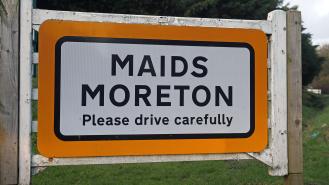
Milton Keynes: Murders
The disturbing histories of communities across Britain are explored in true crime series Murdertown. Host Anita Rani delves into murder cases that rocked these regions, with police officers and victims’ friends and family all giving a 360-degree overview of each homicide.
In Milton Keynes, Anita focuses on the dreadful killing of Rachel Manning, who went missing late one night in December 2000. Hours before, she’d been at a fancy dress party with her boyfriend – and it was on him that the glare of police suspicion fell when her disfigured body was discovered days later. The tragic and traumatic turn of events that followed, and the painstaking quest to find Rachel’s killer, are chronicled in Murdertown.
The whisky-sipping psychotic
Milton Keynes, the most famous of the new towns which were created in the 20th Century, bore witness to another heinous crime just a few years after Rachel’s death. In 2003, a 24-year-old man named Gregory Davis bludgeoned and stabbed 48-year-old Dorothy Rogers at her home, then rounded on her teenage son Michael. In what must have been a truly terrifying spectacle straight out of a slasher film, Michael was seeing desperately running from the knife-wielding Davis, who bore down on his victim in a children’s playground, disembowelling him.
It was later revealed that Davis had developed a fixation with serial killers. While studying A-level art, he’d created a trophy bearing the names of his favourite serial killers, and an extract from his diary stated his intention to kill people 'all over country and world in Las Vegas and swanky bars'.
A medical assessment concluded that Davis had descended into savagery during a 'psychotic episode', and he pleaded guilty to manslaughter with diminished responsibility. Much to the shock of many in Milton Keynes, the killer of the mother and son was given day release from a secure hospital just six years later, and was eventually fully freed in 2011. This was the result of a successful legal challenge which saw a medical tribunal being told that Davis’ psychotic episode had been triggered by alcohol and medication.
Davis would later post a YouTube video showing himself sipping whisky and showing off a luxury watch collection. Meanwhile, the enduring anguish of the family was expressed by a friend of the victims, who was quoted by one newspaper as saying that 'It's as if Davis just had a bad day at the office and is fit to go back to work again now. This man absolutely ruined their lives with a premeditated and merciless attack. It was a bloodbath.'
'I’ve just stabbed the missus.'
What must surely rank as one of the most disturbing 999 calls in British history was made in Milton Keynes in 2018. Sounding calm and rather amused at himself, 52-year-old Shane Clarke rang the operator to say 'I’ve just stabbed the missus.'
The operator was so taken aback by Clarke’s tone that she could only ask, 'You’ve what?' The conversation progressed with Clarke laughingly saying 'I think she’s gone, I think she’s dead mate.'
His 'missus' was 39-year-old Joanne Bishop, whom he’d stabbed dozens of times with a screwdriver in their home. When she was revived by paramedics, his reaction was similarly blasé: 'Sweet. That’s brill. Those ambulances are great aren’t they?'
Sadly, Joanne Bishop died from her injuries some days later. It later transpired that the remorseless Clarke had previously done time for slashing a boy’s face with a razor blade in the late 1980s. An inmate who’d known him at that time told the media that 'We all thought he was a complete psychopath… We were all baby burglars and car thieves committing crimes for money. But Shane was something else entirely. He was terrifying.'
Presiding over the Joanne Bishop case, the judge who sentenced Clarke was clearly flabbergasted by the man’s savagery. 'The number of times that screwdriver was inserted into his victim – no less than 29 times – almost beggars belief,' he said. Clarke was sent down for life, giving a thumbs up and laughing as he left the courtroom.
The Maids Moreton manipulator
'Cruel, calculating, manipulative, deceitful. I don’t think evil is too strong a word for him.' This was one senior detective’s take on Benjamin Field, a 28-year-old churchwarden who had embarked on a sinister and lethal campaign of manipulation in the village of Maids Moreton, just outside Milton Keynes.
The handsome and charismatic Field set his sights on Peter Farquhar, a retired teacher and writer in his late 60s. When they entered into a relationship, Farquhar was overcome with happiness at the attentions of the younger man. 'Gone are the fears of dying alone,' Farquhar said of their relationship. He could never have guessed that he was actually at the mercy of a psychological sadist who – in order to defraud Farquhar and inherit his wealth – embarked on a 'gaslighting' plot to make Farquhar believe he was losing his mind.
Field would spike the older man’s food and drinks with bioethanol and benzodiazepines, causing him to suffer paranoia and night terrors, lose his balance, and have fearful hallucinations of black insects and shards of light. All the while, Field posed as the concerned and dutiful partner. In 2015, he murdered Farquhar – likely suffocating him as he was in a drug-induced stupor. He then shifted his attention to Ann Moore-Martin, a neighbour in her 80s.
Field’s aggressive courtship caused Ann Moore-Martin to become besotted with the much younger man. He, meanwhile, began playing ruthless tricks to manipulate her into giving him tens of thousands of pounds. He even went as far as writing a message from 'God' on her mirror in white marker pen ('Pray for Ben, Ben Loves You').
Fortunately, Ann Moore-Martin was not murdered by Field, dying instead from natural causes in 2017. Ben Field was jailed for life for Farquhar’s killing in 2019. During the murder investigation, it was revealed that Field had drawn up a list of 100 largely elderly targets, and may well have escalated to becoming a new Harold Shipman if he hadn’t been caged.






